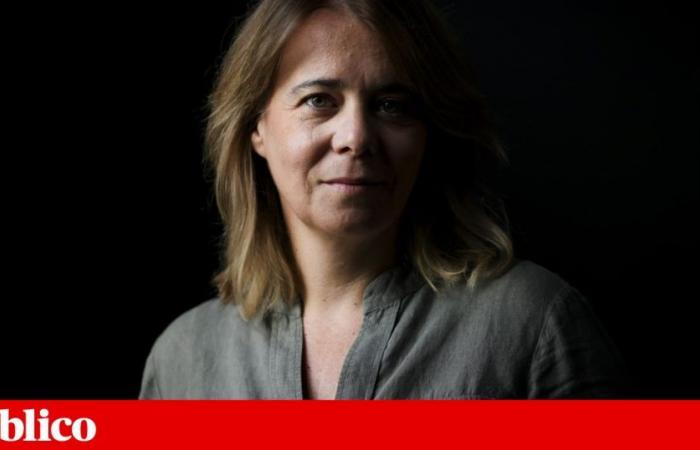
The head of the Left Bloc (BE) list for the European elections, Catarina Martins, argues that “a new project” is needed for the European Union (EU) in order to “popularize democracy” and combat the extreme right. This, creating “vast alliances”, an experience that the former BE coordinator has already had at national level, including during the “contraption”, and now hopes to take to Brussels.
In an interview with PÚBLICO, he advances some measures that should be part of this project, such as “debating forms of cooperation” in Europe (as opposed to NATO), ensuring a greater redistribution of wealth to make a fair climate transition, creating a “solidarity distribution ” in welcoming refugees or discussing democratic control of the European Central Bank (ECB). But also changing the rules of economic governance, namely the way the deficit is accounted for.
He left the leadership of BE and the Assembly of the Republic less than a year ago. Now, she will be a candidate for the Europeans. Why did you decide to embrace a political challenge now?
The question arose of BE needing a strong candidacy for the European elections and there was a perception that I would be the person who could do it. I continue to fight for a left that responds to people. These elections will be particularly important. At a European level we are in a complicated process, with the growth of the extreme right in which we need a new European project that does more than say that we are going to keep everything as it is and that we don’t like the extreme right. This reaffirmation of an empty project, which is not a program for Europe, for us, the people, only makes the extreme right grow.
Is the big priority for these elections fighting the extreme right?
It is a project that can popularize democracy. The extreme right is a clear result of the structural inequalities, structural racism, and patriarchy that remain in society and that must be combated. But you need a project that people can believe in. We cannot tell the younger generations in Europe that everything stays as it is or the far-right bogeyman is coming because as it is it is not working.
What are the axes of this project? The climate crisis?
Surely a fair transition, because we need to be clear: we will not have a project to respond to climate change made against the majority of the people. Either there is a popular majority that understands the transition or it will not be made. We need to be clear about things like there are no green taxes, there are fair and unfair taxes. The transition has costs and they have to be paid by someone. We cannot tell people who are in traditional production models that have to be reconverted that they are to blame. We live in a time when there is an enormous concentration of wealth. It will be necessary to fight for this distribution of income that allows us a fair transition that can create jobs for the climate, change the territory, mobility, housing.
Do you intend to continue Marisa Matias’ legacy?
Marisa Matias was certainly one of the most brilliant MEPs Portugal has ever had. Her struggles on environmental and climate issues, human rights, migration, war and peace are absolutely important and must continue. Afterwards, BE considered whether I was capable of bringing something to this journey. Due to the responsibilities I assumed, I went through the troika period in which it was necessary to create allies. Or when we reached the agreement with the PS in 2015. And even the reconfiguration of the political framework in Europe so that we have a left that understands the need for an ecological transition project. These are processes in which I was very present, with Marisa, and it is this very concrete experience of alliances and ideas that I hope to bring.
Polls show that there will be a right-wing majority and a growth in the extreme right that will call into question issues such as the European Ecological Pact, the issue of migration or support for Ukraine. How can the center and left respond?
It is necessary not to give up lost. The left has no time to feel sorry for itself, it must act and go to battle. Then, the project needs clarity. The ecological pact, having good intentions, has few policies to compete for a social majority for the transition. The migration pact is absolutely unacceptable. I don’t think the left should make an agreement that these things are normal. It is necessary to denounce them because we need to fight for changes. Without a left-wing project that is capable of launching broad alliances, but that is absolutely determined on fundamental issues, climate, human rights, Europe’s social contract, it will not be doing its job.
Should the bridges they want to build with PS, PCP, Livre and PAN extend to the European level?
Discussing alliances without a political program is empty, it says nothing about people’s lives. For example, fighting for the creation of safe entry channels into Europe and changing the Dublin regulation so that countries that have direct entry are not responsible for the refugees and migrants that enter, but there is a solidarity distribution in Europe, with integration policies , this is a proposal. With this proposal, we will work for alliances with those who do not want far-right politics. We have to go with concrete proposals.
Given the growth of far-right parties, many of which are Eurosceptic, and the escalation of the war in Ukraine, does it make sense for BE to maintain a Eurocritical and anti-NATO discourse?
Don’t we have a critical discourse about the conditions of democracy in our country? We have. We defend democracy in our country tooth and nail, but precisely for this reason we think there are things that need to be done differently. This naive Euro idea that Portugal should be completely submissive, have no project and that political forces should not debate is wrong. Likewise, the issue of NATO does not change overnight, but there should be no taboos. Anyone who believed in a kind of democratic goodness in NATO, listen to Donald Trump, you don’t have to listen to BE.
Does Europe need, or not, to start debating forms of cooperation that provide autonomy and true security? Does it make any sense to choose between Putin’s tsarist project or Trump’s imperialist project, when, on top of that, they could end up being the same and Europe has no capacity to protect it from the issues of war and energy?
Should BE not clarify its position on the EU, under penalty of being disadvantaged between a PCP, which is more clearly against it, and Livre, which is more clearly in favor?
BE has a clear position, it is absolutely in support of the fact that there is no place for countries alone and that European cooperation is fundamental. He also thinks that the left should not accept what is producing the extreme right and that Portugal is not a minor partner in Europe. You must have a strategy, alliances and think about common paths. This is called responsibility.
In September, José Gusmão told PÚBLICO that one of the objectives of these elections would be for the EU to have social minimums, even if it had to change the rules of economic governance. What social minimums are these?
We will present the program soon. What I can guarantee is that BE will not accept the current economic governance rules as if they were a law of gravity. Politics is the result of political decision-making and current economic governance rules are objectively destroying public services in Europe.
But is the reform of the Stability and Growth Pact a positive sign or do they continue to defend the repeal of the pact?
The changes, appearing to give countries more leeway, give the European Commission more discretion in imposing rules on countries. These are not good signs. We continue to think that a new social contract in Europe is really important.
Does the fact that the PS managed to meet European budgetary targets not reconcile you with these rules?
More is spent on overtime tasks in the NHS than on doctors’ salaries to avoid structural expenses. From that point of view, it doesn’t reconcile us. We need States to have the capacity to have structural expenditure and investment capacity to avoid degrading public services and economic conditions.
Is that [essa capacidade] not be so dependent on community funds?
Clear. But the problem is what the deficit is measured. States must have sufficiently robust structural expenditure to allow fundamental public services to function. Considering that structural expenditure is an evil in itself and that one can have so-called one-off expenditure, which is repeated every year and causes enormous inefficiency in the way public money is spent, is a problem. It is an option made by the Portuguese government in line with the rules of economic governance and, therefore, it is wrong.
Will repealing the Budgetary Treaty, leaving the Monetary Union, if necessary, or restructuring the debt also remain in the program?
Programs have priorities depending on the times. It was very important that BE did work on the debt. The left will not give up this fight or the fights against what insults the capabilities of the people. But I am much more concerned about the ECB’s democratic control mechanisms. We have an inflationary crisis. The ECB knows perfectly well that it is caused by supply and not demand, it decides to raise interest rates, create a terrible social crisis, and we think we don’t need to discuss democratic control? The ECB does not respond to any democratic body.
To which instance can you respond?
The institutional design of the EU is always complex, but the ECB is the one that is least accountable, neither to the European Parliament nor to the European Council. This is a debate that must be open.
BE set the goal of being the third political force in the European Parliament. After these legislative elections, will you keep it?
I respect many of the goals set by the party and I will do my best.
Is the scenario more difficult than in 2019?
It was different. We were not seeing the growth of the far right.
Tags: Catarina Martins believed democratic goodness NATO listen Donald Trump Interview
--




